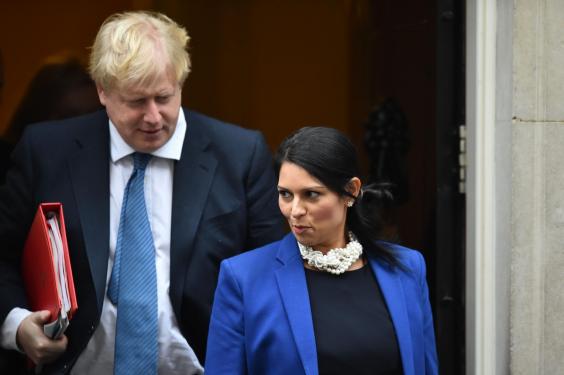Boris Johnson and Priti Patel won’t be as angry over the leaked offshore asylum seeker plans as you may think
The flurry of media reports send precisely the signal they want, that the UK is not a soft touch on asylum and illegal immigration, writes Andrew Grice


You might think that Boris Johnson, Priti Patel and their advisers are hopping mad about the leak of their controversial plans to house asylum seekers on disused ferries, redundant oil rigs or islands thousands of miles away.
You would be wrong. Although a leak inquiry is under way after ministers blamed disenchanted civil servants, Johnson’s allies are far from angry. The flurry of media reports send precisely the signal they want, that the UK is not a soft touch on asylum and illegal immigration.
This message has two audiences: the desperate refugees tempted to cross the English Channel in record numbers in small boats and, more importantly, UK voters – especially in the “red wall” of working class Labour-held seats which went Tory last December.
The bizarre options under consideration are described by Whitehall officials as “blue sky thinking”. But they are not a headline-grabbing stunt dreamt up by Dominic Cummings that will never change policy; the government is desperate to “do something” to counter TV pictures of the Channel crossings.
Patel is interested in the treatment of asylum seekers adopted in Australia, which held them in Nauru and Papua New Guinea, often in poor conditions without proper health and mental health services and legal advice. (Patel should watch the Netflix drama Stateless, which depicts the gruesome conditions permitted by Australia and might make even her think twice about going down this route).
It’s hard to see how the home secretary can square such an approach with her response this week to the inquiry into the Windrush scandal, in which she pledged to “build a fairer, more compassionate Home Office” and a “total transformation of our culture”.
The timing is also a bit odd. Is the UK really going to pack asylum seekers on to ferries – the most likely decision, I’m told – before coronavirus has been seen off?
The explanation is that this is part of a culture war that senior Tories think will replace Brexit as the glue that holds their party together when the EU issue fades from view next January. “What do we do after Brexit?” is a question exercising Tory minds. After purging its pro-Europeans, the party is finally united on Europe. But there are rival Tory tribes on the economy and public services. Cultural issues can bring them together and mask the differences, and so are seen as the right platform for the next general election campaign.
We’ve already had the rows over statues of figures involved in the slave trade and “Rule, Britannia!” at the Proms. Floating the names of Charles Moore and Paul Dacre to chair the BBC and Ofcom respectively was a brilliant piece of Downing Street spin, designed to goad the liberal establishment into a furious reaction and deter other candidates from applying on the grounds the appointments were done deals. If only their communication on coronavirus was as good.
We can expect more bullets in the “war on woke” to be fired at the Tories’ virtual conference starting this weekend. Amanda Milling, the party’s joint chair, told Politico: “We need to focus on our conservative values of fairness, freedom and opportunity. Those were the things, the values, that got us over the line back in December, and the policies that we had in terms of the manifesto and getting Brexit done.”
Patel’s plans for legislation, including longer jail sentences for illegal immigrants, will probably prove a welcome distraction for a Tory audience that is losing faith in Johnson over his response to the coronavirus pandemic. According to a survey by the ConservativeHome website, only 28 per cent of Tory members think the PM is handling it well, and 63 per cent badly. And these are the loyalists.
The Tories know that cultural issues put Labour on the defensive and split Keir Starmer’s party. Starmer is proving more skilful than Jeremy Corbyn at avoiding Tory traps. But Labour’s tensions are real and he is under fire from the left who dislike his focus on patriotism and the family. Starmer’s team is unrepentant: it is rightly exercised by polling for the RSA think tank, showing that among the 48 per cent of the public who have “a lot of respect for traditional British values”, only 22 per cent think Labour best represents them, and 39 per cent the Tories.
However, while the culture war will make the Tories feel good about themselves, it’s unlikely to win them the next election. The “red wall” seats will be crucial, but the Tories are more likely to be judged there on whether they have delivered their ambitious pledges to “level up” the poorest regions. That task has been made much harder by coronavirus and the likelihood that high unemployment will scar the very areas Johnson has promised to revitalise.




Join our commenting forum
Join thought-provoking conversations, follow other Independent readers and see their replies
Comments